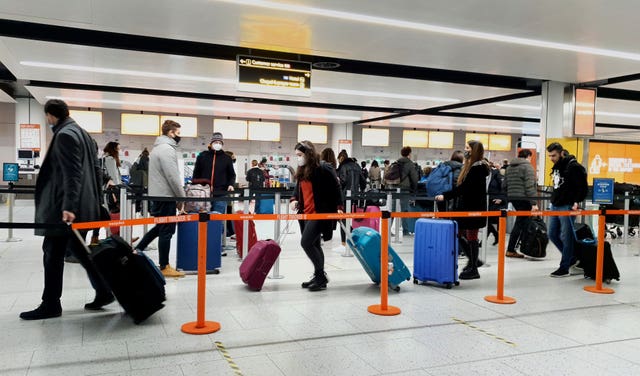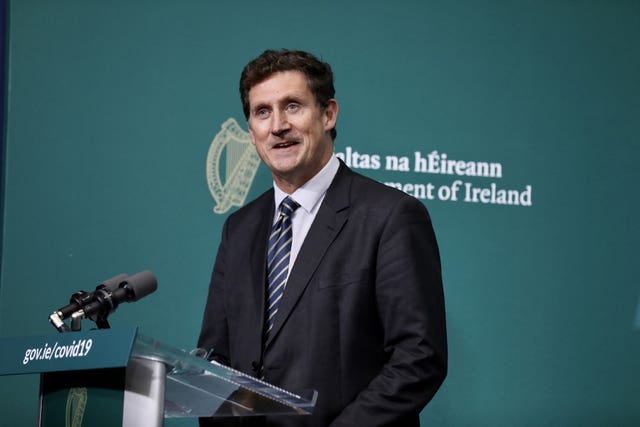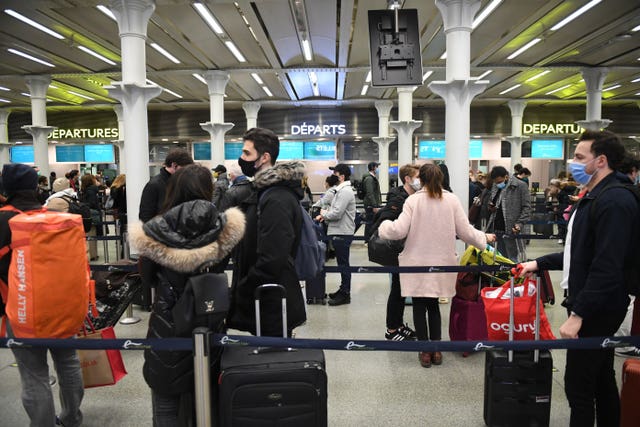
A growing number of nations have banned flights from the UK in a bid to stop a mutant strain of coronavirus crossing their borders.
Here's the answers to some key questions on the latest changes to international travel rules:
– Which European countries have banned flights from the UK?
France, Germany, Italy, Poland, Belgium, Austria, Bulgaria, Finland, Denmark and the Netherlands have all said they will halt flights arriving from the UK.
The Czech Republic has imposed stricter quarantine measures for people arriving from Britain.
 Passengers queue for check-in at Gatwick Airport (Gareth Fuller/PA)
Passengers queue for check-in at Gatwick Airport (Gareth Fuller/PA)
-Which other countries have implemented travel bans?
Turkey and Morocco have announced they will be suspending air travel from the UK, while the official Saudi Press Agency reports Saudi Arabia is also suspending international flights for one week.
El Salvador is barring entry to anyone who has visited the UK in the preceding 30 days.
Canadian prime minister Justin Trudeau said from midnight Sunday, Canada was putting a 72-hour stop on flights from the UK.
– When do the flight bans start and how long do they last?
The Netherlands ban came into force on Sunday morning, with it due to last for at least the rest of the year.
Belgium’s prime minister Alexander De Croo issued a flight ban order for 24 hours starting at midnight on Sunday.
Italy’s health minister Roberto Speranza said an order was signed on Sunday blocking flights from Britain and preventing anyone who had been to the UK in the last 14 days from entering Italy. The order bans plane travel until January 6.
Austria and Italy have not specified when their plans to halt flights from the UK would take place.
Germany said it was banning flights from the UK starting at midnight, Berlin time, on Sunday, with the German dpa news agency reporting it would remain in place until at least December 31.
France has banned all travel from the UK for 48 hours from midnight on Sunday.
Bulgaria said it was temporarily ceasing flights to and from the UK from midnight on Sunday.
Finland is due to suspend all passenger flights with the UK for two weeks from Monday.
Poland is also due to halt flights from midnight on Monday, though it is not yet known how long the ban will be in place.
Denmark said all flights from Great Britain would be halted for 48 hours from Monday.
– What is the situation with Ireland?
The Irish Government said on Sunday that it was imposing a 48-hour ban on flights from Britain to Ireland.
 Eamon Ryan announced the new restrictions (Julien Behal/PA)
Eamon Ryan announced the new restrictions (Julien Behal/PA)
The restrictions came into force at midnight on Sunday.
– Is anyone exempt from the bans?
Ireland’s transport minister Eamon Ryan said ferries will continue to operate for freight between Britain and Ireland.
“We need haulage coming in to keep our shelves full but other passengers will be restricted,” he said.
The German government said exemptions from its flight ban include repatriation flights of planes and their crews, postal, freight or empty flights and aircraft carrying medical personnel.
The Bulgarian embassy in London said on its website that Bulgarian citizens and their families, as well as permanent residents in Bulgaria, were able to enter the country subject to a 10-day quarantine if they fly through a different country or enter Bulgaria on land or by sea.
– What discussions are taking place between governments?
An EU crisis meeting has been called for Monday to discuss the coordination of the response to coronavirus among the 27 member states.
The UK’s Foreign, Commonwealth and Development Office (FCDO) regards other countries’ travel restrictions as a matter for their own governments.
It was previously understood to be in touch with international partners and monitoring the situation closely.
But late on Sunday night No 10 revealed that Prime Minister Boris Johnson is due to chair a meeting of the UK Government’s Cobra civil contingencies committee on Monday.
– Why is this all happening?
A mutant strain of coronavirus sweeping across London and the south east of England has prompted the EU nations to start restricting inbound flights from the UK.
Mr De Croo said Belgium’s flight ban was “out of precaution”, adding: “There are a great many questions about this new mutation and if it is not already on the mainland.”
The German embassy in London tweeted that flight restrictions were the result of “the coronavirus mutation”.
On Saturday, Mr Johnson said there was “no evidence” the new variant “causes more severe illness or higher mortality” but “it does appear to be passed on significantly more easily”.
He said the new strain could be up to 70% more transmissible than the old virus variant.
– Are international train and ferry links running?
Eurostar said it was unable to run trains from London to Paris, Brussels, Lille or Amsterdam on Monday or Tuesday.
Trains to London from Paris will continue to operate, with the rail company saying it planned to resume services to and from the UK on Wednesday.
Eurotunnel said access to its UK site prohibited from 10pm after its last train left at 9.34pm.
Dover’s ferry terminal has also closed to “all accompanied traffic leaving the UK” after France moved to shut its border.
 People at St Pancras station in London, waiting to board the last train to Paris (Stefan Rousseau/PA)
People at St Pancras station in London, waiting to board the last train to Paris (Stefan Rousseau/PA)
– Am I allowed to travel abroad from England?
If you are living in one of the newly created Tier 4 areas, which encompasses London and parts of the south east and east of England, you must not travel abroad.
Government guidance states people can only travel internationally if you are “legally permitted to do so, for example, because it is for work”.
Across England people are advised to stay local and avoid travelling outside their area.
For those living in Tier 1, 2, and 3 areas, the guidance advises potential international travellers to “carefully consider whether they must travel abroad”.
It advises them to “follow the rules in their area” and consider the public health advice in the country they plan to visit.
Someone living outside Tier 4 can transit into or through a Tier 4 area to travel abroad if they need to.
People are also warned to check travel advice from the FCDO and what rules are in place at their destination. For many countries the FCDO is advising against “all but essential travel”.



Why are you making commenting on The Herald only available to subscribers?
It should have been a safe space for informed debate, somewhere for readers to discuss issues around the biggest stories of the day, but all too often the below the line comments on most websites have become bogged down by off-topic discussions and abuse.
heraldscotland.com is tackling this problem by allowing only subscribers to comment.
We are doing this to improve the experience for our loyal readers and we believe it will reduce the ability of trolls and troublemakers, who occasionally find their way onto our site, to abuse our journalists and readers. We also hope it will help the comments section fulfil its promise as a part of Scotland's conversation with itself.
We are lucky at The Herald. We are read by an informed, educated readership who can add their knowledge and insights to our stories.
That is invaluable.
We are making the subscriber-only change to support our valued readers, who tell us they don't want the site cluttered up with irrelevant comments, untruths and abuse.
In the past, the journalist’s job was to collect and distribute information to the audience. Technology means that readers can shape a discussion. We look forward to hearing from you on heraldscotland.com
Comments & Moderation
Readers’ comments: You are personally liable for the content of any comments you upload to this website, so please act responsibly. We do not pre-moderate or monitor readers’ comments appearing on our websites, but we do post-moderate in response to complaints we receive or otherwise when a potential problem comes to our attention. You can make a complaint by using the ‘report this post’ link . We may then apply our discretion under the user terms to amend or delete comments.
Post moderation is undertaken full-time 9am-6pm on weekdays, and on a part-time basis outwith those hours.
Read the rules hereLast Updated:
Report this comment Cancel